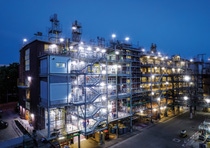Media
BASF and ExxonMobil Join Forces to Advance Low - Emission Hydrogen Through Methane Pyrolysis Technology
- Industry leaders team up to accelerate methane pyrolysis – a technology that produces low-emission hydrogen and solid carbon
- Methane pyrolysis complements both companies’ technology portfolios
- A demonstration plant is planned in Baytown, Texas, to validate the technology at scale
LUDWIGSHAFEN, Germany, and HOUSTON, USA – November 17, 2025 – BASF and ExxonMobil have formed a strategic collaboration to advance methane pyrolysis technology, a next step toward delivering efficient, cost-competitive low-emission hydrogen solutions for industrial use. The companies have signed a joint development agreement to co-develop methane pyrolysis technology, including plans to construct a demonstration plant aimed at commercial readiness.
Strength in collaboration
“This collaboration combines technological innovations and industrial expertise of ExxonMobil and BASF to accelerate the development of low-emission hydrogen,” said Mike Zamora, president of ExxonMobil Technology and Engineering Company. “Methane pyrolysis holds real potential, especially in regions where traditional carbon capture and storage solutions are less viable. ExxonMobil brings decades of deep technical knowledge in methane pyrolysis and a shared commitment to innovation.”
BASF has been developing methane pyrolysis technology over the past several years in a project funded by the German Federal Ministry of Research, Technology and Space (BMFTR).
“This novel methane pyrolysis technology generates competitive low-emission hydrogen and has a high potential for further reduction of the carbon footprint of our product portfolio. In line with our Winning Ways strategy, it will contribute to our ambition to be the preferred chemical company to enable our customers’ green transformation,” said Dr. Stephan Kothrade, member of the Board of Executive Directors and Chief Technology Officer at BASF. “We have been working on this technology for more than a decade and developed a superior reactor concept that we successfully validated at our test plant in Ludwigshafen. By combining BASF’s process innovation with ExxonMobil’s scale-up expertise we are bringing this cost-efficient low-emission hydrogen solution closer to economically viable industrial deployment.”
A Competitive Approach to Low-Emission Hydrogen
Methane pyrolysis uses electricity to convert natural gas or other gases, like bio-methane, into hydrogen and solid carbon. The technology offers several significant advantages: it does not generate process-related CO2 emissions, unlike traditional methods for hydrogen production such as steam-methane reforming, requires approximately five times less electrical energy than water electrolysis and does not require the use of water. Moreover, it leverages existing natural gas infrastructure, and therefore is easily deployable in different locations. The lack of process CO2 emissions makes it particularly attractive for regions where carbon capture and storage face geologic, technical or policy-related challenges.
This process creates two valuable products: low-emission hydrogen and high-purity solid carbon. Hydrogen is both an important energy carrier and an essential feedstock in the chemical industry. The solid carbon has applications across multiple industries including steel, aluminum manufacturing, construction and advanced carbon products, like battery materials.
Demonstration Plant to Advance Commercial Readiness
The companies plan to construct and operate a demonstration plant capable of producing up to 2,000 tons of low-carbon emission hydrogen and 6,000 tons of solid carbon product annually. This facility – which will be located at ExxonMobil’s Baytown Complex – will serve as a critical step toward commercial readiness and help validate the technology at scale.
About ExxonMobil
ExxonMobil, one of the largest publicly traded international energy and petrochemical companies, creates solutions that improve quality of life and meet society’s evolving needs.
The corporation’s primary businesses - Upstream, Product Solutions and Low Carbon Solutions – provide products that enable modern life, including energy, chemicals, lubricants, and lower emissions technologies. ExxonMobil holds an industry-leading portfolio of resources, and is one of the largest integrated fuels, lubricants, and chemical companies in the world. ExxonMobil also owns and operates the largest CO2 pipeline network in the United States.
To learn more, visit exxonmobil.com and ExxonMobil’s Advancing Climate Solutions.
Follow us on LinkedIn.
About BASF
At BASF, we create chemistry for a sustainable future. Our ambition: We want to be the preferred chemical company to enable our customers’ green transformation. We combine economic success with environmental protection and social responsibility. Around 112,000 employees in the BASF Group contribute to the success of our customers in nearly all sectors and almost every country in the world. Our portfolio comprises, as core businesses, the segments Chemicals, Materials, Industrial Solutions, and Nutrition & Care; our standalone businesses are bundled in the segments Surface Technologies and Agricultural Solutions. BASF generated sales of €65.3 billion in 2024. BASF shares are traded on the stock exchange in Frankfurt (BAS) and as American Depositary Receipts (BASFY) in the United States. Further information at www.basf.com.
|
Media contact: |
|
|
BASF Birgit Hellmann Phone: +49 152 564 499 78 |
ExxonMobil Matt Keever Phone: +1 737 272 1452 |

